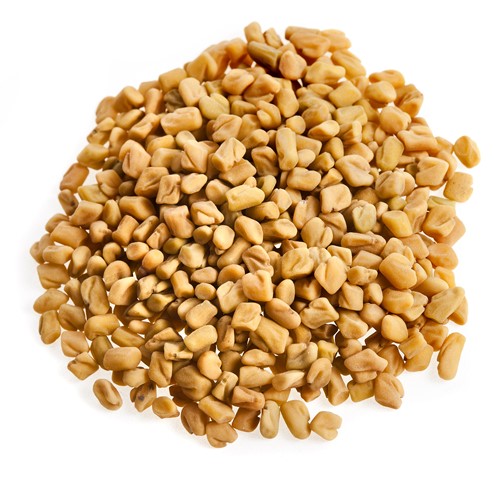
Scientific Name: Trigonella Foenum Graecum
Higher Classification: Fenugreeks
Family Name: Fabaceae
Rank Name: Species
Order Name: Fabales
Kingdom: Plantae
Genus: Trigonella
Species: Trigonella foenum-graecum
Division: Magnoliophyta
Fenugreek
Published Date: 6/17/2023 5:53:59 AM
What is Fenugreek:
- Fenugreek is a clover-like herb that lowers blood sugar levels, increases milk production in breastfeeding mothers, reduces cholesterol levels, reduces heart problems, lowers inflammation, protects against cancer.
- Fenugreek, also known as "Methi" in Hindi and "Methika" in Sanskrit, is a highly effective herb that is native to southern Europe and the Mediterranean region and is cultivated in southeastern Europe, western Asia, India, and northern Africa. People use its fresh and dried seeds, leaves, twigs, and roots as a spice, flavoring agent, and supplement. While more research is necessary, some studies show that fenugreek may have varied health benefits. (More Details)
- Composition: Fenugreek herb contains chemicals like diosgenin, gitogenin, tigogenin, trigonelloside, isomer yamogenin, choline, trigonelline, yamogenin, gitogenin, diosgenin, and tigogenin, etc. It also has nutritional contents like thiamin, riboflavin, folic acid, niacin, riboflavin, B6, vitamins A, C, and K, copper, calcium, selenium, zinc, manganese, magnesium, and potassium.
Availability:
- It is available in powder form (three to five grams with plain water after meals once or twice daily) and capsule form (one or two capsules with plain water after meals once or twice daily). It is also available as seeds and leaves which can be used for flavors and cooking.
What are its benefits:
- Used in Diabetes: About 80% of the total content of free amino acids in the seeds is present as 4-hydroxy isoleucine, which appears to directly stimulate insulin. Taking fenugreek seed may lower blood sugar levels in people with diabetes. Doses of at least 5 grams daily seem to help.
- Beneficial for Breast-Feeding Mothers: 5-8 grams of fenugreek seeds are soaked in water overnight. The next day this is cooked well with 200 ml of milk. If one likes, jaggery can be added. This helps to increase breast milk production. Taking fenugreek capsules or drinking fenugreek tea beginning shortly after giving birth can increase milk production in breastfeeding women.
- Improves digestive issues: As this herb balances Vata dosha in the body, it prevents constipation as well as digestive problems created by stomach ulcers and is also effective for treating gastritis and indigestion. Taking a specific fenugreek product (Fenulife) before the two biggest meals of the day reduces symptoms of heartburn.
- Fenugreek Herb is used in Obesity & Weight loss: Drinking fenugreek seed soaked in water helps in weight loss. Fenugreek leaves are packed with antioxidants and nutrients that help rev up metabolism and promote fat burning. Fenugreek is a natural digestive tonic and the lubricating properties in it help soothe your stomach and intestines.
- Beneficial in Inflammatory Skin Conditions: The anti-inflammatory and antioxidant properties of this herb reduces inflammatory conditions of the skin. It gives effective results in itching problems. Fenugreek herb also acts as a blood purifier. To the injured and inflamed skin, you can make a paste of dried leaves or seeds. Apply it over the affected area of the skin. Fenugreek herb relieves pain, inflammation, reduces abscess, wounds, swelling, and boils.
- Reduces risk of heart disease: Fenugreek seeds have a significant effect on cardiovascular health. It protects the heart from serious damage during a heart attack. Heart attacks are a major cause of death, and they occur when an artery leading to the heart gets clogged. Fenugreek seeds prevent further damage to the heart and counteract the oxidative stress that occurs during a heart attack.
- In foods, fenugreek is included as an ingredient in spice blends. It is also used as a flavoring agent in imitation maple syrup, foods, beverages, and tobacco. Fenugreek seeds smell and taste similar to maple syrup. In manufacturing, fenugreek extracts are used in soaps and cosmetics.
- Fenugreek paste as a hair conditioner: 8-10 grams of fenugreek seeds are taken and soaked in water and kept overnight. This is made into a fine paste and this is applied to the scalp as a hair mask. This is retained for 30-45 minutes and rinsed with water. Fenugreek extract containing trigonelline and trigonelline acid may be used as a hair growth stimulant.
- For reducing cholesterol: 10-gram fine powder of fenugreek is administered along with warm water (or buttermilk), daily. 5 grams 2 times a day can also be administered. Continuing 20 to 30 days reduces cholesterol significantly.
- Good for Liver Health: Fenugreek seeds are very effective in controlling the impact of alcohol on your liver. Excessive alcohol intake can cause chronic liver damage. Fenugreek seeds contain polyphenolic compounds that help reduce liver damage and help metabolize alcohol.
Ayurvedic Properties:
- "Deepani": This herb improves the digestive fire.
- "Vatahara": It balances Vata dosha disorders like paralysis, constipation, neuralgia, and bloating, etc.
- "Kaphahara": It balances Kapha disorders like asthma, bronchitis, chest congestion, and cough, etc.
- "Prameha": This herb is very much effective in type 2 diabetes mellitus, and urinary tract disorders.
- "Aruchi": Beneficial in anorexia.